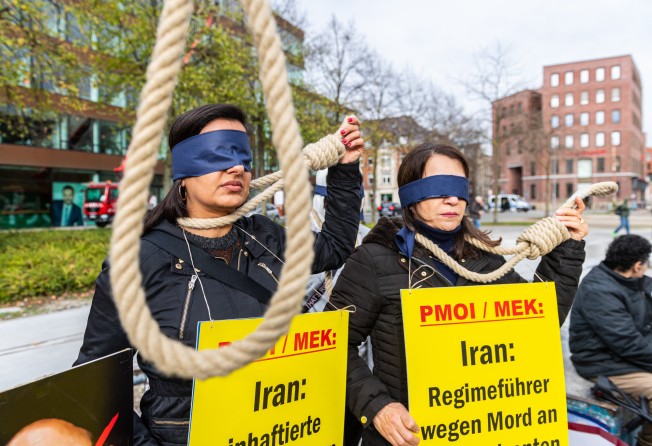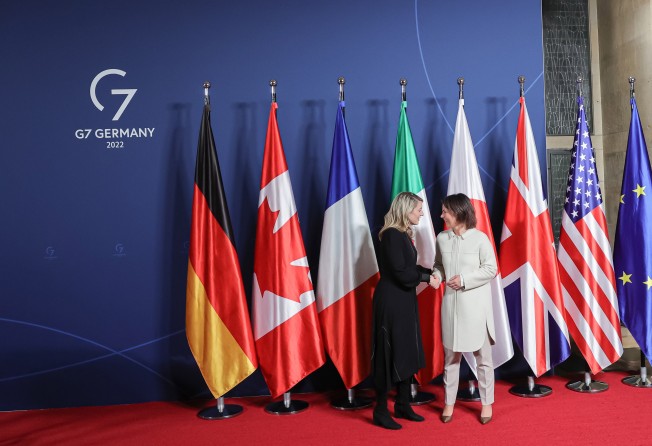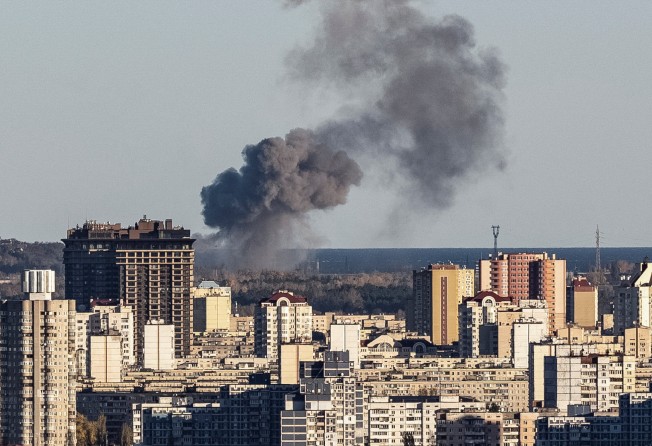
G7 grapples with Ukraine war, China clout, Iran crackdown
- Meeting in Germany, foreign ministers from the world’s major nations were taking stock of Ukraine’s situation and its ripple effects far from Europe
- The diplomats are also looking to further harmonise policies related to Chinese investment as well as to caution against antagonistic moves against Taiwan

Top diplomats from the world’s major industrialised democracies are grappling with the implications of Russia’s war in Ukraine, China’s growing economic clout and aims on Taiwan, and Iran’s crackdown on anti-government protesters as they opened two days of talks on Thursday.
Meeting in the Western German city of Muenster, foreign ministers from the Group of Seven nations were taking stock of the situation in Ukraine more than eight months since Russia invaded the country, exacerbating food and energy shortages and creating ripple effects far from Europe.
“While we are steadfast in our support for Ukraine, we must not forget that the impacts of Russia’s aggression, interference and hostility extend across the world,” British Foreign Secretary James Cleverly said ahead of the meeting.
Russian President Vladimir Putin’s “actions are plunging the world’s poorest further into despair, putting global food security on the brink and pushing up energy prices,” he said. “These actions only serve to demonstrate Putin’s true intentions and further unite the international community against his callous plans.”
The meeting in Muenster comes nearly a year after the G-7 nations – the UK, Canada, France, Germany, Italy, Japan and the United States – banded together to warn Russia of “massive consequences” if it went ahead with plans to invade Ukraine.
Putin denied having such plans, and some nations saw the West’s repeated alerts of a Russian troops build-up near Ukraine as exaggerated at the time.
Since delivering the initial warning to Moscow – two months before the invasion was launched in late February – the G-7 nations have largely followed through with their vow to punish Russia, although sanctions have done little to deter the Kremlin.
Russia has instead escalated its attacks targeting civilian infrastructure, sent more troops, illegally annexed areas of Ukraine and shown no interest in a diplomatic solution. A senior US official travelling with Secretary of State Antony Blinken to Muenster said Putin had “doubled down” and, in some cases, “tripled down” on his position.
Although a potential world food crisis was averted on Wednesday when Russia agreed to rejoin a wartime agreement that allowed Ukrainian grain and other commodities to reach global markets, other emergencies loom. They include the war’s impact on energy supplies, Russia’s unfounded claims that Ukraine is preparing to use a radioactive “dirty bomb” and suggestions Moscow might respond with nuclear weapons.
Senior US officials said they expected the discussions at Muenster’s town hall – which local officials say was last used to host an international diplomatic event in 1648, for the signing of the Treaty of Westphalia that ended the 30 Years War – to reaffirm G-7 “alignment and consistency” on Ukraine and a number of other issues.

Those include joint approaches to China, which has sided with Russia over Ukraine while also seeking to boost investments in critical and sensitive infrastructure in the West, and Iran, which in addition to conducting a brutal crackdown on protesters is accused of supplying Russia with armed drones and possibly other weapons for use in Ukraine.
The G-7 has weathered major changes since the foreign ministers issued their stark pre-war ultimatum to the Kremlin last December in Liverpool, England: Britain is on its third prime minister, there’s a new right-wing government in Italy, relations between Germany and France have frayed and control of the US Congress may be about to shift, with potential implications for Ukraine policy.
The ministers’ discussions in Germany will look at holding the bloc together in the face of Ukraine conflict, which has exacerbated global shortages of food and energy as famine looms in parts of Africa and winter approaches in Europe. The European Union is considering moving forward with price caps on Russian energy imports aimed at further stifling Russia’s income, a move that some hope might help convince the Kremlin to stop the fighting and engage in diplomacy.

On China, US officials said the G-7 would be looking to further harmonise their policies related to Chinese investment in their countries as well to caution against antagonistic moves that Beijing might take against Taiwan.
German Chancellor Olaf Scholz is visiting Beijing this week, becoming the first European leader to make the trip since the war in Ukraine began. Chinese investment in a major port project in Germany has raised concerns in Washington and other capitals that China might gain a controlling interest in critical infrastructure in the heart of an allied country.
US officials said they were pleased the Hamburg port contract was amended to reduce China’s stake to a minority position but said it was important that all nations look carefully at proposed Chinese investments and the potential security threats they might bring.
Scholz has pledged to use his trip to make the case for Chinese moderation and help in calming the situations with Ukraine and Taiwan.